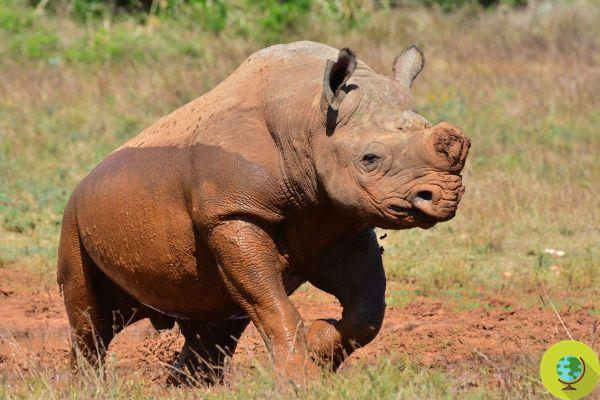
Asian gang XTC has been doing business with illegal wildlife trafficking, slaughtering South African rhinos for decades.
He is about to end up run over, his mother saves himTrafficking in wild and / or endangered animals is a global scourge. Southeast Asian crime gang XTC has been slaughtering South African rhinos for decades to sell their horns in Asia, doing millionaire deals and using young Asian prostitutes as "stakes".
The Asian gang XTC uses young prostitutes as young as 19 as "scapegoats" to circumvent the strict laws in place regarding wildlife hunting and uses sacks of potatoes to smuggle pangolin flakes. This extensive criminal gang runs a huge poaching network, from which they have made huge profits.
The gang, operating since 1990, has been responsible for horrific killings of endangered animals and to pursue its criminal policy has lured numerous vulnerable women, depriving them of dignity and freedom; in addition, it has resorted to corruption to obtain immense benefits, creating fictitious companies apparently engaged in legal activities, such as agricultural production, trade in agricultural products and services in the food sector.
How illicit trafficking took place
Although they are based in Laos e Vietnam, , these companies are part of a much larger system with strong political connections and, thanks to their illicit trafficking of wild animals, are able to satisfy the increased demand for exotic animals in Southeast Asia.
The animal species subject to illegal trafficking mostly come from South Africa, Mozambique, Uganda and neighboring countries.
The real business of these companies is based on the industrial breeding of the pangolin for the sale of its meat and scales and on the massacre of rhinos to steal the precious horns, which are presumed to have medicinal powers.
Each rhino horn can yield over 40 thousand euros, so the major leaders of the criminal organization, such as Boonchai Bach, Chumlong Lemtongthai e Vixay Keosavang, they got rich by earning millions from illicit business operations.
Some members of the gang also ran illicit trafficking in Vietnam and were organized in operational cells located on the border with the poor city of Laos, where the illegal wildlife trade has thrived due to endemic corruption and the absence of specific regulation. inside the country.
Due to the illegal trafficking of the XTC gang, the number of culled rhinos in South Africa has grown considerably over the past two decades, from a total of 13 in 2007, to 83 in 2008, to 1.028 in 2017 - an average of about three rhinos slaughtered every day.
Thai prostitutes used as a cover
The fragile ones Thai women, hired by Lemtongthai, they handed over the passport to the exploiters and from that moment on they became the object of trafficking: sold, forced by force or attracted by the promise of a paid job, they were sent to South Africa; arrived at their destination, they were abused and forced into prostitution until they met hypothetical "foreign husbands".
These women had to pretend to be hunters and exhibited the killed animals as trophies. A technique devised not only for the purpose of obtaining (through the payment of bribes to public officials) legal export certificates in compliance with the Convention on International Trade in Endangered Species (CITES), but also to ship the horns to Laos via the Thailand, where a single shipment allows you to earn up to 250 thousand dollars (over 210 thousand euros) if sold to large retailers and collectors.
Further details emerged from the investigation: once permits were obtained, Lemtongthai and his followers took the prostitutes to a fake farm where wild animals were slaughtered; each woman was forced to pose with the dead rhino holding a rifle to take an official photograph. An expert in nature conservation, present during the hunting operations, was in charge of measuring the horns once removed and recording their characteristics in a special register.
According l 'ONG Freeland - engaged in investigative and intelligence activities with a team of 50 investigators under the guidance of Steve Galster, founder of the organization - the real principal of Lemtongthai would be Vixay Keosavang, former military intelligence officer and businessman from Laos.
The arrest of the bosses
Cooperation between Thailand and South Africa resulted in Lemtongthai being sentenced to 2012 years in prison in November 40, despite the reduced sentence on appeal having reduced the prison sentence to 6 and a half years; with that historic sentence, one of the most dangerous criminals in the world in the sector of illegal wildlife trafficking had been brought to South African justice.
In March 2013, Thai police issued an arrest warrant for Keosavang, which has not yet led to his capture. Other members of the criminal gang were subsequently arrested, including the arrest in Thailand in 2018 of the notorious trafficker Boonchai Bach, guilty of trafficking 14 rhino horns from Africa to Thailand.
Despite the aforementioned arrests, the illegal wildlife trade unfortunately continues. It should also be noted that Galster himself recently declared that banning the trade in wild animals could also help reduce the intensity and frequency of pandemics such as that from Covid-19, which are still ongoing.
Fonti: Freeland/The Independent/Guardian
Read also:
Malaysia's last male Sumatran rhino has died
China legalizes tiger bones and rhino horns for traditional medicine, a sensational step backwards
Bella, the white rhino killed to steal the last inch of her horn


























